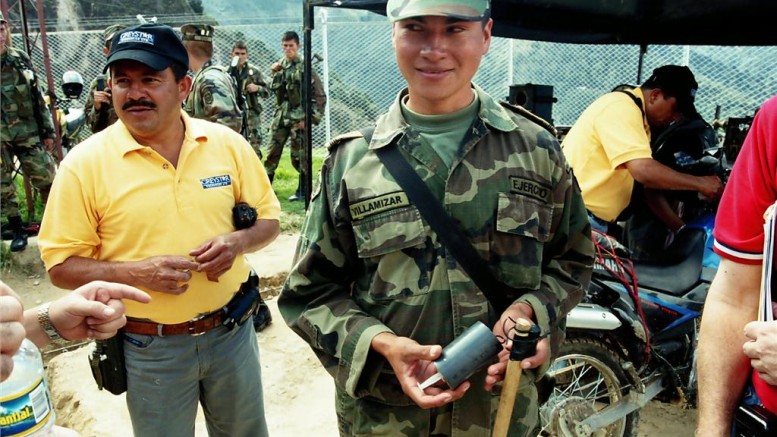Income from gold mining has overtaken drug trafficking in some provinces for the Revolutionary Armed Forces of Colombia (FARC), according to a new report from political risk firm Exclusive Analysis.
In some cases, the rebel groups and a new generation of drug gangs, known locally as “Bacrims,” are carrying out their own gold mining operations, and in others, they are collecting protection money for equipment owned by mining companies, Amanda Russo, the intelligence company’s head of corporate communications, elaborates in an email from London.
“The scant security force presence in some of these remote areas permits the FARC and Bacrims to latch onto this, and often fight each other for the right to extort,” Carlos Caicedo, head of the agency’s Latin American Forecasting and author of the report, outlined in a press release.
It is a similar situation in the departments of Cauca, Choco and Valle del Cauca, the report claims. Caicedo also noted that FARC and drug gang involvement in gold mining increases the risk of extortion and property damage, particularly in places like Antioquia and Putumayo.
He says there is also evidence of armed groups controlling coltan and tungsten operations in the eastern provinces of Vichada and Guainia.
But Robert Carrington, president and chief executive of Colombian Mines Corp. (CMJ-V), who has worked in Colombia for two decades, says the FARC have been doing this for some time and that the government is battling it. He also says the report doesn’t break any new ground.
“Every once in a while someone reinvents the terror wheel about Colombia,” he says. “They try to bring out how dangerous a place it is and [mention] the drugs, and it’s almost shock value to get people to read whatever it is they’re trying to say.”
Carrington says the FARC has engaged in illegal mining activity and extorted small Colombian miners for years, adding that he doesn’t know of any multinationals that are grappling with the issue. Extortion is usually a problem for Colombian nationals who are operating small placer operations, he explains, where one man with an excavator hires five or six men to help him. “Sometimes the guys will get a knock on their door at midnight and someone sticks a gun in their mouth, and collects what they call a ‘war tax.’ It’s protection money.”
Some of the guerrillas are also mining placer gold themselves, he adds. They will get equipment, either by stealing it or buying it, and find an area that’s rich in placer gold.
Carrington says guerrilla bands can show up almost anywhere, but for the most part, they avoid highly populated areas that have good road networks, because that is where they can be cornered by police and the military. He also points out that gold mining has been part of the country’s culture and its economy since pre-Columbian times, and as a result, all the roads are in some of the more prospective gold regions, and generally these areas have high levels of security.
“I tell all our investors that it’s just like working in Los Angeles,” he says. “If you go into the wrong neighbourhood, you are going to have trouble. But there are a lot of people who work in L.A. every day and never have a problem with crime or gangs.”
But Colombia is still a country where you want to be careful, and companies that operate in more remote guerrilla-held territory are taking risks, he says. “There are some foreign companies operating in some parts of Colombia, and I don’t know how they’re operating, unless they’re paying protection money,” he says. “There are some companies working in parts of Colombia that I still elect not to work in. And whether it’s because they have military security there or maybe they pay protection money, I don’t know.”


Be the first to comment on "Colombian rebels like gold"